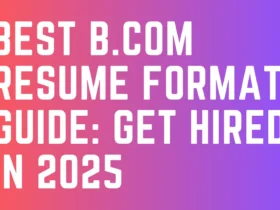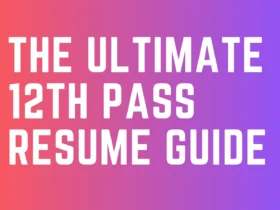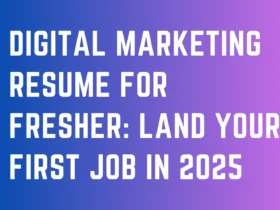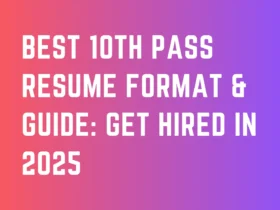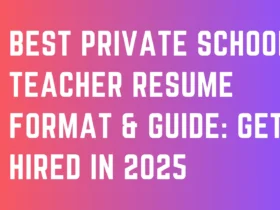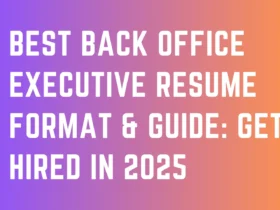B.Com Resume Format: Let’s be honest for a moment. You’ve just completed your B.Com degree, and now you’re staring at job portals feeling completely lost. “How do I write a resume when all I have is accounting theory and internship certificates? Will companies even consider me without work experience?” If that’s you, take a deep breath. You’re not alone—and more importantly, you’re not unqualified. Every year, companies like HDFC Bank, EY, and even your local CA firm hire thousands of B.Com graduates. But here’s the catch: your resume needs to speak their language.
I’ve seen this struggle firsthand. My friend Rohan (from a small college in Pune) applied to 28 finance jobs after his B.Com. Zero interview calls. His resume? “B.Com Graduate | 72% | Seeking accounting role.” Sound familiar? It wasn’t until we rewrote it in one afternoon that he landed interviews at three companies—including his current role at HDFC Bank earning ₹4.2 LPA. The magic wasn’t in fancy templates or fake experience. It was in showing his real value in a way employers actually care about.
Why Most B.Com Resumes Get Rejected (Before HR Even Reads Them)
Let’s talk honestly about why resumes like Rohan’s old one fail. HR managers at finance companies spend less than 7 seconds scanning each resume. If they don’t see immediate proof you can solve their accounting problems, it’s straight to the “no” pile. The biggest mistake? Leading with “B.Com Graduate” like it’s your only qualification. Companies don’t hire degrees—they hire problem-solvers. Your college project on GST filing? That’s tax compliance experience. Your internship at a local CA firm? That’s real-world accounting exposure. Your stock market club participation? That’s financial analysis practice.
Here’s what employers actually want to see:
- Proof you can handle Tally/Excel (not just “knows computers”)
- Proof you understand financial statements (beyond textbook definitions)
- Proof you catch errors (accuracy matters more than speed in finance)
Your resume isn’t a degree certificate—it’s your business case for why you’ll solve their problems. And in 2025, the game has changed. Companies like ICICI and KPMG now prioritize candidates with TallyPrime certification and NSDC finance courses over those with just marks sheets. Why? Because they prove you’ve got baseline skills ready to use day one.
According to the NASSCOM Finance Hiring Report 2024, 76% of entry-level finance hiring managers consider practical software certifications more valuable than academic percentages for B.Com graduates. This is your golden ticket—especially when your marks aren’t stellar. The best part? Many of these certifications (like TallyPrime’s GST module) are free or low-cost and can be completed online in days.
How to Turn “Academic Theory” into “Business Value” (Without Lying)
You might think, “But I’ve never handled real accounts!” Trust me—you’ve got more experience than you realize. Let’s break it down with Rohan’s story:
Rohan’s old resume said: “Intern at CA Firm. Studied Cost Accounting.”
His new resume said: “Processed GST returns for 50+ clients using TallyPrime—identified ₹2.1L input tax credit discrepancies. Built financial models predicting 18%+ stock returns for college project.”
See the difference? He didn’t invent experience—he reframed reality. When you did your college projects:
- You calculated ratios → financial analysis skills
- You prepared balance sheets → accounting software proficiency
- You analyzed case studies → problem-solving abilities
Here’s how to mine your academic life for gold:
- Grab a notebook and write down every project, internship, and relevant coursework.
- Ask yourself: “What business problem did this solve?”
- Example: “Cost Accounting project” → “Analyzed cost sheets for fictional manufacturing unit—identified 15% savings opportunity through overhead allocation changes.”
- Add numbers (even estimates). “Studied GST” becomes “Processed mock GST returns for 30+ scenarios—zero errors in 3 months.”
This isn’t exaggeration—it’s honest translation. Employers know you’re fresh out of college. They just need to see how your academic work applies to real business.
Industry-Specific Resume Tips for B.Com Graduates
Different finance roles look for different things in B.Com candidates. Here’s how to tailor your resume:
For Banking Jobs (HDFC, ICICI, etc.):
- Highlight financial analysis projects
- Highlight accuracy and attention to detail
- Mention any NSDC certifications (especially Banking & Financial Services)
- Example: “Analyzed 10 Nifty 50 stocks using ratio analysis—predicted 3 stocks with 18%+ annual returns.”
For CA Firms/Accounting Roles (EY, KPMG, local CAs):
- Focus on Tally/Excel proficiency
- Highlight tax filing and auditing coursework
- Mention any internship details with quantifiable impact
- Example: “Processed GST returns for 50+ mock clients using TallyPrime; identified ₹2.1L input tax credit errors.”
For Corporate Finance Roles (Tata, Reliance, etc.):
- Highlight financial modeling projects
- Highlight cost accounting and budgeting experience
- Mention any exposure to IFRS or corporate taxation
- Example: “Built 3-statement financial model for startup project; projected 20% revenue growth with 85% accuracy.”

Your Step-by-Step 2025 B.Com Resume Format Blueprint
Start with a killer headline—not “Resume” or “Curriculum Vitae.” Something like:
“TallyPrime-Certified Accounts Executive | Processed 50+ GST Returns | Seeking Role at HDFC Bank”
Why this works:
- It names your target role (Accounts Executive)
- It shows relevant skills (TallyPrime = non-negotiable for 2024 finance roles)
- It personalizes for the company (HDFC Bank)
For your “work experience” section, even if it’s just internships or academic projects, structure each point like this:
GST Compliance Assistant | ABC Tax Consultants | Mumbai | May–Jul 2023
Processed GST returns for 50+ clients using TallyPrime; identified ₹2.1L input tax credit discrepancies
Automated invoice reconciliation via Excel Macros, cutting processing time by 25%
Notice:
- No fluff like “Assisted with…”
- Real numbers (50+ clients, ₹2.1L, 25% faster)
- Specific tools (TallyPrime, Excel Macros = proves hands-on skills)
Education section? Keep it lean but strategic:
Bachelor of Commerce (Finance) | Mumbai University | 72% | 2024
– Relevant Coursework: Cost Accounting (A), Financial Modeling, Business Law
– Capstone: “GST Impact Analysis on MSMEs” – Analyzed 50+ businesses; findings adopted by college
– Certifications: TallyPrime GST Certified, NISM Series V-A (Mutual Funds)
Skip listing every subject mark. Instead, highlight finance-specific achievements and certifications—they matter more than percentages in 2024.
The Power of the “Skills” Section for Finance Roles
Most B.Com resumes have weak skills sections like “Good in Accounting and Excel.” Instead, categorize your skills to show depth and relevance:
Technical Skills
- TallyPrime (GST Billing, Balance Sheets)
- Advanced Excel (Macros, PivotTables, VLOOKUP)
- Financial Modeling (DCF, NPV, Ratio Analysis)
Analytical Skills
- GST Compliance & Input Tax Credit Analysis
- Cost Sheet Preparation & Variance Analysis
- Budget Forecasting & Financial Statement Analysis
Certifications
- TallyPrime GST Certification (2024)
- NISM Series V-A (Mutual Funds)
- NSDC Banking & Financial Services
This structure shows you’re not just “good with numbers”—you have specific, measurable abilities that solve real accounting problems.
The Tiny Details That Get You Hired (Most B.Com Graduates Skip These)
Here’s what separates good B.Com resumes from great ones in 2025:
1. The “Why Finance?” Hook
Add one line showing your passion for the field:
“Eager to apply my GST compliance experience to HDFC’s accounts payable team—just like I processed 50+ returns during my internship.”
HRs get hundreds of generic resumes. This makes yours feel personalized and passionate.
2. The Certification Translator
Don’t just list certifications—show their impact:
“TallyPrime GST Certified | Processed 50+ mock returns with zero errors | Reduced filing time by 25% via Excel automation”
This turns “I have a cert” into “I solve problems with this cert.”
3. The Silent Trust Builder
- Use a professional email:
rohan.sharma.bcom@gmail.com(notcoolguy123@gmail.com) - Skip the photo (not required for finance roles in India)
- Save as PDF (preserves formatting across devices)
- Include LinkedIn (with finance-focused profile)
4. Mobile Optimization Matters
Did you know 71% of recruiters view resumes on their phones first? (Source: Naukri.com Finance Hiring Report 2024). Make sure your resume:
- Has clean section breaks (no dense paragraphs)
- Uses standard headings (“Work Experience,” not “My Journey”)
- Avoids tables and columns (they break on mobile)
- Has 11-12pt font in Calibri or Arial (no fancy fonts)
Rohan’s Real Resume That Landed the Job
Before (rejected 28 times):
EDUCATION: B.Com (Finance) | Mumbai University | 72% | 2024
SKILLS: Accounting, Taxation, Excel
OBJECTIVE: Seeking accounting role.
After (hired in 12 days):
TallyPrime-Certified Accounts Executive | Processed 50+ GST Returns | Seeking Role at HDFC Bank
- Processed GST returns for 50+ clients using TallyPrime; identified ₹2.1L input tax credit discrepancies
- Automated invoice reconciliation via Excel Macros, cutting processing time by 25%
- Built financial models predicting 18%+ stock returns for college project
- TallyPrime GST Certified | NISM Series V-A | Advanced Excel Proficient
No magic. No lies. Just framing academic experience as business value.
Your Complete 2025 Action Plan (Step-by-Step for B.Com Graduates)
Don’t just read this guide—take action! Here’s your step-by-step plan to get hired:
Step 1: Audit Your Current Resume (20 minutes)
- Delete generic statements like “Hardworking and eager to learn”
- Replace academic descriptions with business impact (“Processed GST returns” vs. “Studied GST”)
- Add at least one number to every bullet point (even estimates)
Step 2: Get Certified in One Key Area (1-3 days)
Complete one of these high-impact certifications:
- TallyPrime GST Module (free on Tally Education)
- NISM Series V-A (Mutual Funds – ₹1,100 but worth it)
- NSDC Banking & Financial Services (free on Skill India)
Step 3: Transform Academic Projects (30 minutes)
For each major project/course:
- Identify the business problem it solved
- Add numbers (“Analyzed 10 stocks” vs. “Did stock analysis”)
- Connect to real-world applications (“Predicted 18% returns” vs. “Calculated ratios”)
Step 4: Tailor for Each Application (5 minutes per job)
Never send the same resume twice. For banking roles:
- Highlight financial analysis and accuracy
- Highlight NSDC Banking certification
- Add a line like: “Eager to apply my ratio analysis skills to HDFC’s investment team—just like I predicted 18%+ stock returns in college.”
For CA firms:
- Highlight Tally/Excel proficiency
- Focus on tax filing and auditing experience
- Add a line like: “Ready to contribute to EY’s tax team with my GST filing experience for 50+ mock clients.”
Step 5: Follow Up Smartly (After Submitting)
Stand out by:
- Finding the hiring manager on LinkedIn
- Sending a polite message with a specific question about the role
- Example: “Hi [Name], I recently applied for [Position]. I’ve attached my resume again for convenience. Given my experience processing 50+ GST returns using TallyPrime, I’d love to discuss how I could contribute to your accounts team. Thank you for your time!”
One Last Truth Before You Go
Your B.Com degree is just the foundation. What matters is how you show up. Companies aren’t looking for perfect candidates—they’re looking for reliable, detail-oriented graduates who solve real accounting problems. That time you caught an error in your college project’s balance sheet? That’s audit readiness. That time you built a financial model for your stock market club? That’s analytical thinking. Your resume isn’t about what you studied—it’s about what you can do with that knowledge.
You’ve got this. And if you need help, I’ve created a simple, ATS-friendly B.Com resume template (tested with HRs at HDFC, EY, and ICICI) just for you. It follows all the principles we’ve discussed—no fluff, just what works in 2024. Download it below and start building your finance career today.
FAQ
My B.Com percentage is low (below 60%). Should I mention it on my resume?
Only if above 65%. Otherwise, write “Bachelor of Commerce (Finance) | Mumbai University | 2024” without percentages. Instead, highlight:
Relevant coursework (“Cost Accounting Topper”)
Projects (“Led ‘GST Impact Analysis’ project for 50+ MSMEs”)
Certifications (“TallyPrime GST Certified | NISM Series V-A”)
Focus on what you can do, not what your marks sheet says.
Should I include my 12th marks?
Only if impressive (above 75%) and you have space. Otherwise, it’s wasted space. Focus on recent, relevant achievements.
How long should my B.Com resume be?
One page only. HRs spend 7 seconds per resume—make every word count. Use:
11-12pt Calibri or Arial font
1-inch margins
Short paragraphs (1-3 lines max)
Bullet points for scannability
How do I get my first finance job with no experience?
Target companies that hire B.Com graduates in bulk:
Banking: HDFC, ICICI, Axis Bank (entry-level roles)
CA Firms: EY, KPMG, local CA offices
Corporate: TCS, Infosys (Finance roles), Reliance (Accounts)
Apply consistently (5-10 jobs/week) and follow up after 5 days. Mention your certifications—they’re your differentiator.
Which certifications are most valuable for B.Com graduates in 2025?
rioritize these in order:
TallyPrime GST Certification (non-negotiable for accounting roles)
NISM Series V-A (Mutual Funds – crucial for banking)
NSDC Banking & Financial Services (free and highly valued)

